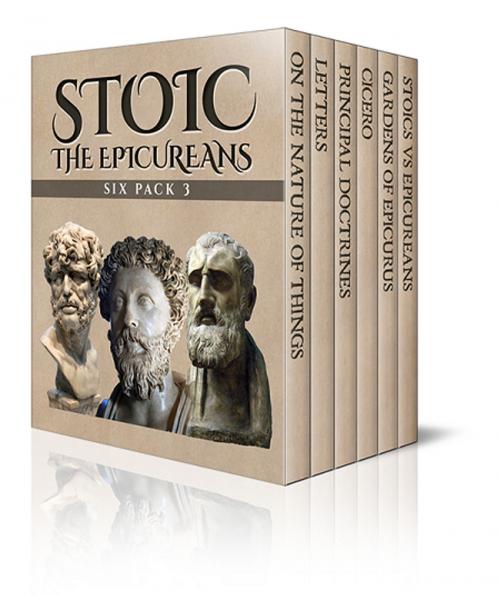Stoic Six Pack 3
The Epicureans
Nonfiction, Religion & Spirituality, Philosophy, Metaphysics, Ancient, Ethics & Moral Philosophy| Author: | Epicurus, Cicero, Lucretius | ISBN: | 1230000465397 |
| Publisher: | Enhanced E-Books | Publication: | June 2, 2015 |
| Imprint: | Language: | English |
| Author: | Epicurus, Cicero, Lucretius |
| ISBN: | 1230000465397 |
| Publisher: | Enhanced E-Books |
| Publication: | June 2, 2015 |
| Imprint: | |
| Language: | English |
“It is folly for a man to pray to the gods for that which he has the power to obtain by himself.”
-Epicurus
Founded in the fourth century BC, Epicureanism was the main alternative philosophy to its popular rival Stoicism. Based upon the teachings of Greek philosopher Epicurus, the philosophy propounded an ethic of individual pleasure as the sole or chief good in life. Epicurus advocated living in such a way as to derive the greatest amount of pleasure possible during one's lifetime, yet doing so moderately in order to avoid the suffering incurred by overindulgence in such pleasure. It is not the same as hedonism which advocates the partaking in fleeting pleasures such as constant partying, sexual excess and decadent food. Epicurus considered prudence an important virtue and perceived excess and overindulgence to be contrary to the attainment of true happiness. The emphasis was placed on pleasures of the mind rather than on physical pleasures. For Epicurus, who you dine with is more important than what you eat.
Epicurus lived a celibate life but did not impose this restriction on his followers. He ran a school from his home called The Garden, a small but prestigious gathering that emphasized friendship as an important ingredient of happiness. It was a sophisticated place by Athenian standards, counting women and slaves among its members and it was the first recorded organization to make vegetarianism a way of life.
The school's popularity grew and it became, along with Stoicism and Skepticism, one of the three dominant schools of Hellenistic Philosophy. Epicureanism flourished for seven centuries.
Stoic Six Pack 3: The Epicureans brings together six Epicurean master works:
The Letters of Epicurus
Principal Doctrines of Epicurus
De Finibus Bonorum et Malorum by Cicero
On The Nature of Things by Lucretius
Upon The Gardens of Epicurus by William Temple
Stoics vs Epicureans by Robert Drew Hicks
These six texts provide a full introduction to Epicureanism from Epicurus himself in Letters and Principal Doctrines, perspective from perhaps the most articulate Roman of all, Cicero, in De Finibus Bonorum et Malorum, poetic elucidation from Lucretius in On The Nature of Things, analysis from English philosopher William Temple in Upon The Gardens of Epicurus and a direct comparision of Epicureanism with Stoicism in Robert Hicks’ lively essay Stoics vs Epicureans.
Thomas Jefferson referred to himself as an Epicurean. It is reasonable to infer that Epicurus had an influence on the founding father when he penned the immortal phrase "… life, liberty and the pursuit of happiness." More recently, Stephen Greenblatt, in his best selling book The Swerve, identified himself as strongly sympathetic to Epicureanism.
“It is folly for a man to pray to the gods for that which he has the power to obtain by himself.”
-Epicurus
Founded in the fourth century BC, Epicureanism was the main alternative philosophy to its popular rival Stoicism. Based upon the teachings of Greek philosopher Epicurus, the philosophy propounded an ethic of individual pleasure as the sole or chief good in life. Epicurus advocated living in such a way as to derive the greatest amount of pleasure possible during one's lifetime, yet doing so moderately in order to avoid the suffering incurred by overindulgence in such pleasure. It is not the same as hedonism which advocates the partaking in fleeting pleasures such as constant partying, sexual excess and decadent food. Epicurus considered prudence an important virtue and perceived excess and overindulgence to be contrary to the attainment of true happiness. The emphasis was placed on pleasures of the mind rather than on physical pleasures. For Epicurus, who you dine with is more important than what you eat.
Epicurus lived a celibate life but did not impose this restriction on his followers. He ran a school from his home called The Garden, a small but prestigious gathering that emphasized friendship as an important ingredient of happiness. It was a sophisticated place by Athenian standards, counting women and slaves among its members and it was the first recorded organization to make vegetarianism a way of life.
The school's popularity grew and it became, along with Stoicism and Skepticism, one of the three dominant schools of Hellenistic Philosophy. Epicureanism flourished for seven centuries.
Stoic Six Pack 3: The Epicureans brings together six Epicurean master works:
The Letters of Epicurus
Principal Doctrines of Epicurus
De Finibus Bonorum et Malorum by Cicero
On The Nature of Things by Lucretius
Upon The Gardens of Epicurus by William Temple
Stoics vs Epicureans by Robert Drew Hicks
These six texts provide a full introduction to Epicureanism from Epicurus himself in Letters and Principal Doctrines, perspective from perhaps the most articulate Roman of all, Cicero, in De Finibus Bonorum et Malorum, poetic elucidation from Lucretius in On The Nature of Things, analysis from English philosopher William Temple in Upon The Gardens of Epicurus and a direct comparision of Epicureanism with Stoicism in Robert Hicks’ lively essay Stoics vs Epicureans.
Thomas Jefferson referred to himself as an Epicurean. It is reasonable to infer that Epicurus had an influence on the founding father when he penned the immortal phrase "… life, liberty and the pursuit of happiness." More recently, Stephen Greenblatt, in his best selling book The Swerve, identified himself as strongly sympathetic to Epicureanism.















